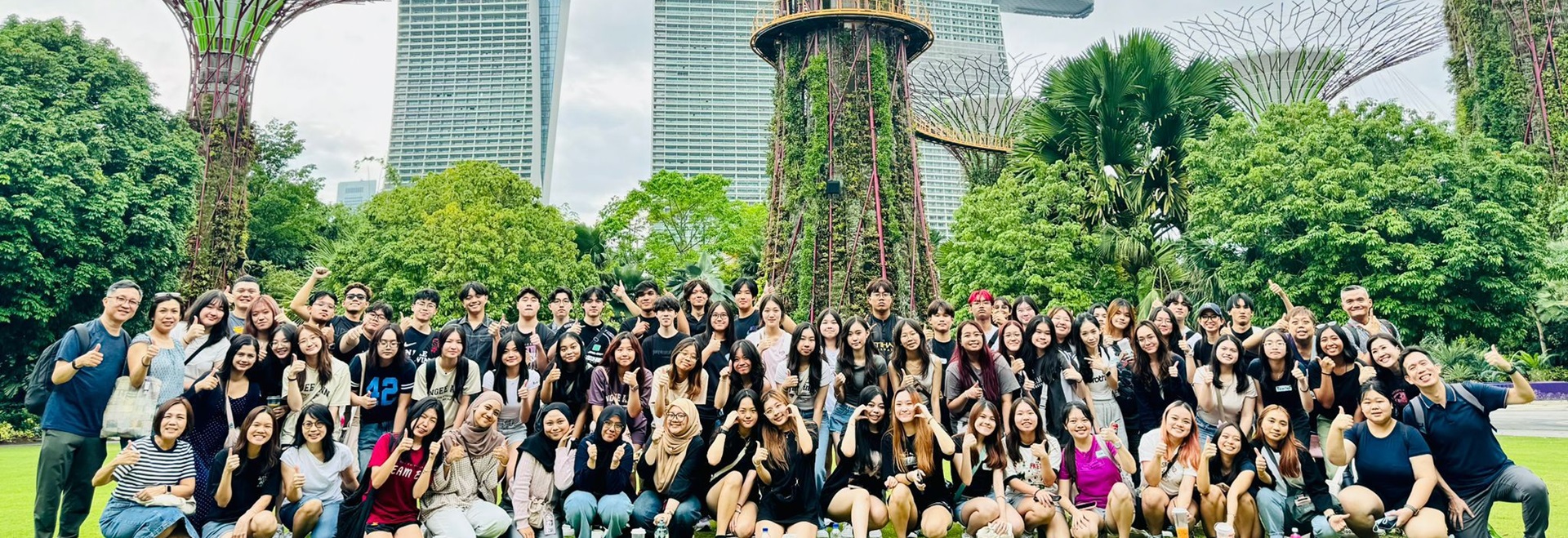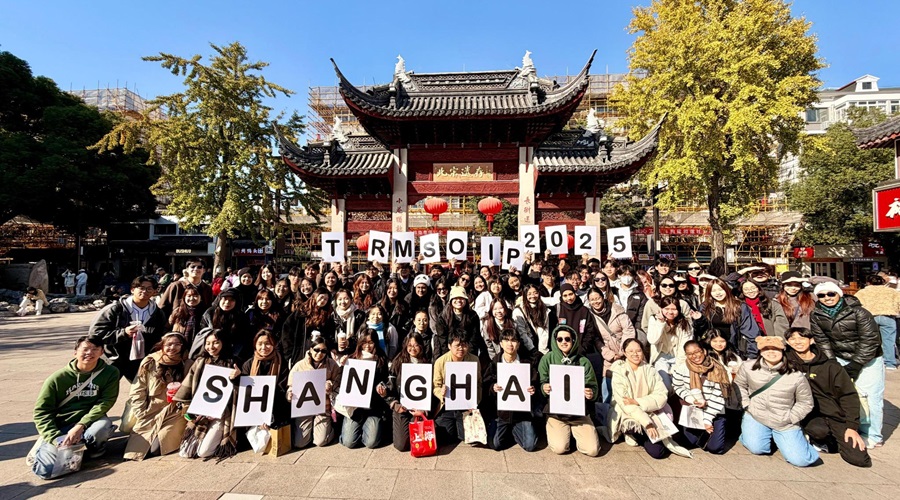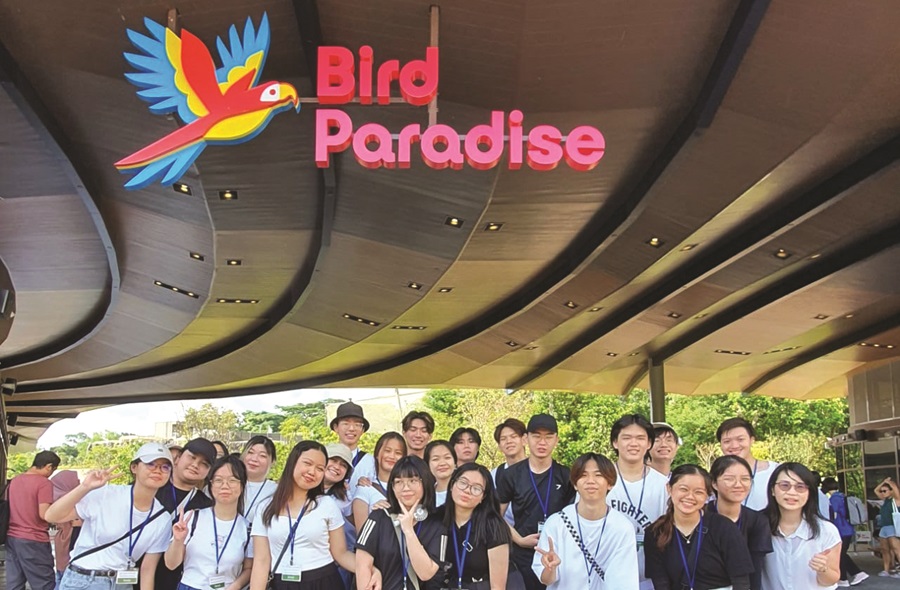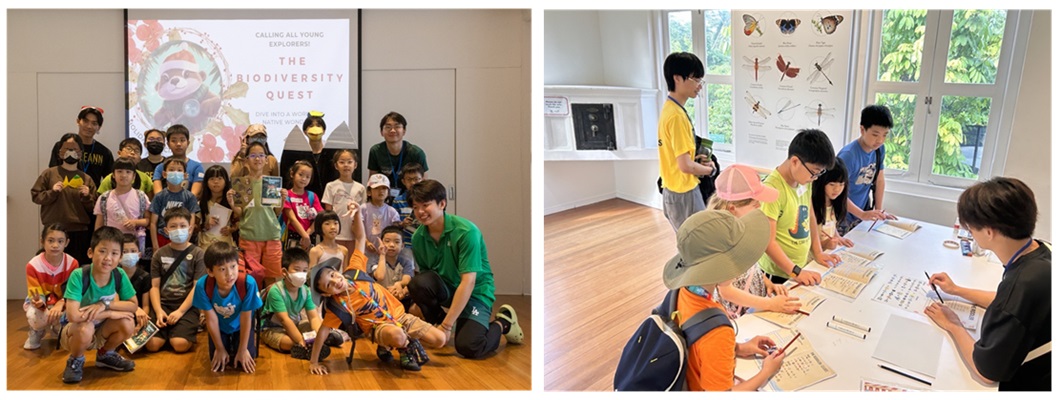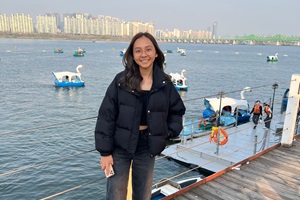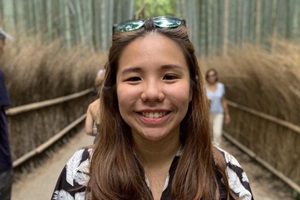Why TRM?
- A robust business course with versatility to explore exciting careers in tourism, hospitality and beyond
- Go on a Signature Overseas Study Trip New! to experience innovative tourism concepts in emerging areas such as sustainable tourism, wellness travel, and TravelTech!
- Build diverse competencies in experience design, research & data storytelling, digitalisation, sustainable tourism and more
- Customise your learning: Choose a six-month local/overseas internship + Business Electives NEW! in emerging areas; or the one-year JobReady Programme with renowned companies
- Two prestigious University Pathway Programmes NEW – Fast-track to an NTU or SMU degree by taking uni modules while in poly!
About TRM
With global tourism on the rise, organisations are innovating to create unique experiences to stay ahead. NP’s Diploma in Tourism & Resort Management (TRM) prepares you to shape the future of tourism across the hospitality, travel, events, and leisure & lifestyle sectors. With TRM, you will go places!
TRM provides you with a good grounding in business
concepts, with a focus on key sectors such as events,
leisure, hospitality, and travel. You will develop the
skills to ideate business strategies and manage
projects in the tourism sector and beyond.
With the growing emphasis on sustainability in tourism,
you will also have the opportunity to learn and
apply the latest sustainability standards for tourism
businesses developed by leading organisations such
as the Global Sustainable Tourism Council (GSTC).
To meet the needs of today’s tech-savvy travellers,
you will gain in-demand skills in tourism data
analytics, digital marketing, and service experience
design. Explore the latest technologies such as
artificial intelligence and augmented reality to
enhance guest experiences.
Plus, you can earn Google Ads and Google Data
Analytics certifications to gain a competitive edge.
The TRM curriculum is enriched with immersive learning
experiences including masterclasses conducted by
experts and experiential learning journeys to world-class tourist attractions and organisations! From
hackathons, company-based projects, field research
to online learning, you can expect varied learning
experiences.
To top it off, you will go on TRM’s Signature Overseas
Study Trip! Feel the pulse of a popular tourism
destination in fast-growing Southeast Asia and
witness other vibrant cities to how the latest tourism
concepts in sustainable tourism, wellness tourism and
TravelTech are generating buzz.
You will also benefit from a wide range of industry
immersion opportunities at reputable organisations
such as Raffles Singapore, Sentosa Development
Corporation and Changi Airport Group.
With the tourism industry thriving in destinations like
China, Thailand and Vietnam, go on an overseas
internship, including opportunities at Hong Kong
Disneyland, to gain global exposure!
Take uni-level modules from Nanyang Technological University’s Nanyang Business School or Singapore Management University’s School of Accountancy while in NP! Apart from broadening your academic horizons, you stand to get credit exemptions
to fast-track to your degree when you officially enrol in these institutions.
* For selected students.
Choose how and what you learn in your final year! Opt for a six-month local/overseas internship together with an industry capstone project and two electives from the new Business Electives Programme; or choose the one-year JobReady Programme for deeper
industry immersion.
Designed to supercharge your learning, the Business Electives Programme focuses on the latest strategic growth areas in business:
- Business Psychology
- AI & Digital Transformation
- Business Sustainability
Overview of your TRM Journey
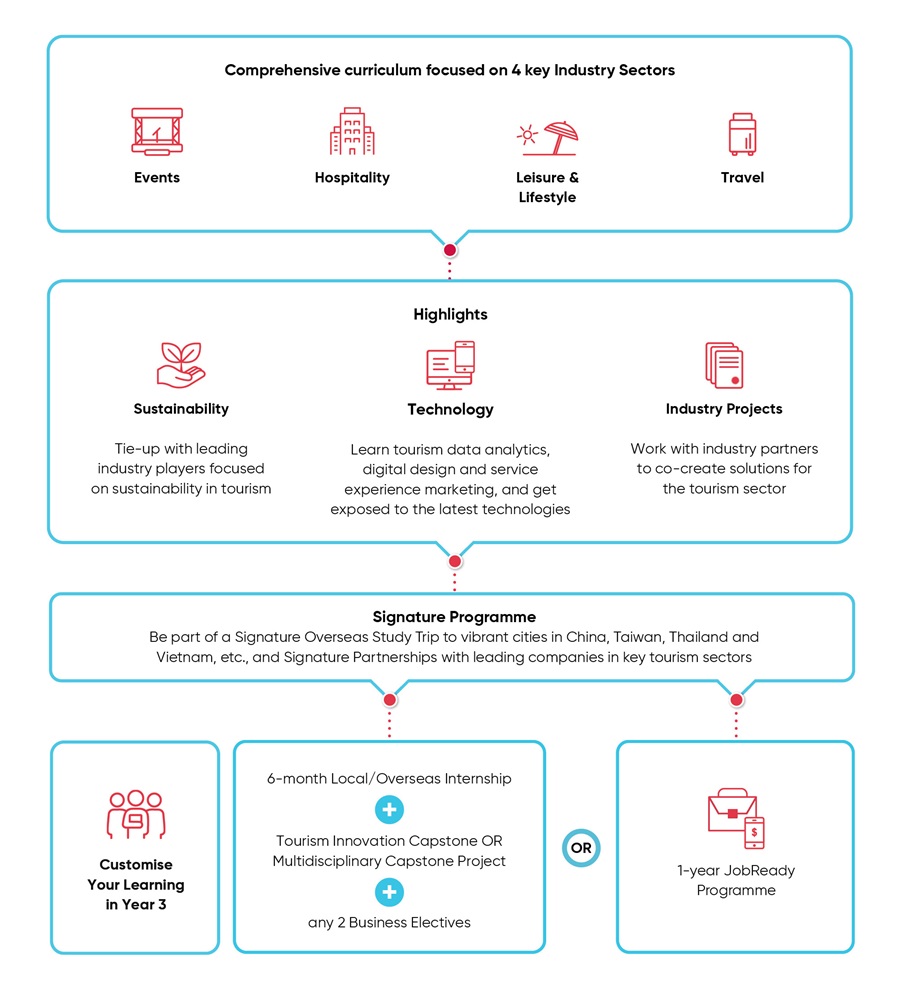
Highlights
Further Studies
As a TRM graduate, you can pursue various degree courses at universities locally and abroad, with some institutions offering module exemptions. They include reputable universities such as Southern Cross University, University of Queensland, University of Southern Queensland, and University of Nevada, Las Vegas.
Careers
As Singapore develops into a global tourism hub, the
demand for skilled tourism professionals will increase.
TRM graduates can explore many job opportunities
in attractions, food and beverage, hospitality, MICE,
travel and other tourism-related sectors.
You can look forward to pursuing careers in these
job roles:
- Attractions Operations Executive
- Business Development Executive
- Content and Experience Development Executive
- Customer Experience Executive
- Digital Marketing Executive
- Event Operations Executive
- Front Office Executive
- Guest Relations Executive
- Marketing Communications Executive
- Product Experience Development Executive
- Reservations Executive
- Sustainability Officer
- Travel Account Executive
Entry Requirements
AGGREGATE TYPE ELR2B2-B
To be eligible for consideration, candidates must have the following GCE ‘O’ Level examination (or equivalent) results.
| Subject | 'O' Level Grade |
|---|---|
| English Language | 1-6 |
| Additional Mathematics/Mathematics | 1-6 |
| Any one of the 2nd group of Relevant Subjects for the ELR2B2-B Aggregate Type | 1-6 |
Applicants must also fulfil the aggregate computation requirements for the ELR2B2-B Aggregate Type ( English Language, 2 relevant subjects and 2 other best subjects) listed at www.np.edu.sg/docs/ELR2B2.pdf .
For students with other qualifications, please refer to the NP website for the entry requirements and admissions exercise period.
What You Will Learn
This module equips students with the essential skills to extract meaningful insights from data. Through a blend of theoretical concepts and practical applications using data visualisation tools, students will learn to collect, clean, analyse, and visualise data to inform decision-making. The module emphasizes critical thinking, problem-solving, and the ability to communicate findings effectively.
Economics (3 Credit Units)
This module provides students with an understanding of the core principles of microeconomics and macroeconomics with an application of these concepts in real-world business scenarios. Topics include Demand and Supply, Price Elasticity, Market Structure, Gross Domestic Product, Unemployment, Inflation, Fiscal and Monetary policy.
Global Business (3 Credit Units)
This module provides students with fundamental knowledge of how the external business environment, consisting of country and industry level factors, affects the overall strategy, organisational structure and various internal functions of international businesses. Students will also discuss how contemporary world affairs, such as the impact of globalisation, terrorism, pandemics, emergence of economic powers in Asia and digitalisation present both opportunities and challenges to international businesses.
Makings of a Business (4 Credit Units)
Students will gain hands-on and real-world experience as they actively learn to integrate and apply knowledge and skills acquired in various modules to manage different types of businesses through game simulation. They will gain understanding of the inter-dependence of the different business functions, and to make data-driven decisions to address day-to-day operations of a business. They will also develop critical thinking and complex problem-solving skills as they analyse performance data and evaluate decisions to improve overall company performance.
Statistical Applications for Business (4 Credit Units)
This module introduces students to basic statistical concepts, tools, models, and the introductory use of generative AI. Students will learn how to organise and analyse data, as well as interpret results for decision-making in the business world. Students will apply and reinforce their learnings through data presentation, use of AI, performing descriptive analysis and data generated from the Business Simulated Game.
Health & Wellness (1 Credit Unit)
This is a Level 1 Core module for all Year 1 students. The module will introduce students to the importance of maintaining both physical and mental health through the knowledge and monitoring of health indicators, and application through appropriate exercises. The aim of the module is to empower students with basic knowledge and skills to be independent and responsible in maintaining overall personal health.
Innovation Made Possible^ (3 Credit Units)
English Language Express* (Credit Units - NA)
English Language Express aims to give you a better grounding in the English Language and to strengthen the written and oral communications skills that you will need in your academic and professional careers. You will be engaged in writing, reading, listening and speaking activities that will develop your ability to speak and write grammatically, coherently and clearly. You will also hone your reading and listening comprehension skills.
* This module is only offered to students who are weaker in the English Language.
^ Critical Core modules account for 10 credit units of the diploma curriculum. They include modules in innovation and world issues, as well as an interdisciplinary project. By bringing students from diverse diplomas together, the interdisciplinary project fosters collaboration to explore and propose solutions for real-world problems. NP aims to develop students to be agile and self-directed learners, ready for the future workplace.
This module equips students with essential written and oral communication skills for professional success. Students will learn to craft clear and logical business messages, deliver impactful elevator pitches, and present persuasive business ideas using storytelling and persuasion principles. They will also create a professional digital profile to enhance their online presence, building their confidence to engage and network with a diverse audience.
Kickstart a Business (4 Credit Units)
The module is designed for students to integrate and apply learning from the different modules to address real-world challenges provided by industry partners. Using the Lean methodology, students will build a Lean Canvas Model to develop and showcase a minimum viable product to address challenges and evaluate opportunities. They will learn about resource optimisation and value creation for businesses.
Finance & Accounting for Business (3 Credit Units)
The module imparts basic accounting and finance knowledge to students, in areas such as accounting equations, accounting principles, financial statements, ratio analysis, cash budgeting, short-term financing strategies, time value of money and capital investment analysis. Students will demonstrate their understanding by using financial software to interpret financial accounting information for decision-making in business environments when working on integrated project scenarios.
Marketing (3 Credit Units)
The module provides students with a strong foundation in marketing, equipping them with the skills necessary to develop effective marketing plans and strategies for the digital landscape. Students will gain a comprehensive understanding of fundamental marketing concepts, with a specific focus on their application in the digital realm.
Digital Experience Design (3 Credit Units)
This module equips students with practical skills in user-centred design for business digital applications, covering key design principles, interface and experience evaluation across platforms, and the use of AI-powered software tools and highlighted through examples like AI-enabled solutions.
Career & Professional Preparation (2 Credit Units)
This module supports students in their journey of self-discovery, character-building, NP values-inculcation, development of education and career goals via experiential activities and guided reflections with CPP coaches. To prepare them for their career and the future, students will also deepen their knowledge of the respective diploma curriculum and industries through learning journeys, mentorship and opportunities for interactions with alumni and industry practitioners. The module will incorporate a more comprehensive feedback and reflective approach from self, peers, tutors and the industry mentor to support students’ holistic growth and development.
This module guides students through the full event lifecycle—from conceptualisation to execution—with a real-world industry partner. Students will learn key event management principles, apply sustainability concepts, and explore the latest event technologies. Through hands-on projects, practicum opportunities, and post-event evaluation, they will gain industry-relevant experience in planning, marketing, logistics, and risk management to create impactful events.
Immersive Travel Experience (3 Credit Units)
This module introduces students to the key components in the tourism ecosystem, including accommodation, airlines, attractions, cruises, MICE & leisure events, national tourism organisations as well as travel intermediaries including OTAs and tour operators. Through experiential learning, students will explore industry dynamics and stakeholder roles and apply the insights gained to design an immersive travel experience.
Integrated Tourism Marketing (3 Credit Units)
This module applies service and digital marketing to the tourism context, covering areas including omnichannel strategies, influencer marketing, email marketing & automation as well as performance marketing and analytics. Students will learn to develop data-driven campaigns, measure ROI, and enhance customer engagement through hands-on projects, equipping them with practical skills to drive customer reach and engagement in a dynamic tourism landscape.
Professional Branding & Networking (4 Credit Units)
This module enhances students' communication skills by focusing on professional branding and networking. Students will learn to craft impactful job application letters and resumes, develop effective job interview techniques through online lessons and role-plays, and strengthen their professional digital profiles. They will also participate in networking simulations across diverse business settings, equipping them with the confidence and skills needed for career success.
Service Experience Design (3 Credit Units)
This module focuses on equipping students with the knowledge and skills to create memorable service experiences for guests in the tourism sector. Through customer journey mapping, design thinking and storytelling, students will work on real-world scenarios with industry partners to deliver innovative and quality guest experiences across diverse tourism settings.
Sustainable Destination Management & Placemaking (3 Credit Units)
This module examines sustainable destination management within tourism precincts and explores how placemaking fosters collaboration between tourism establishments, local communities, and businesses. Students will analyse strategies for balancing economic, environmental, and socio-cultural sustainability through stakeholder engagement, destination planning, and place activation. Through case studies and projects, they will develop solutions to enhance destination appeal and long-term viability.
The module equips students with essential business knowledge of airport, airline, cruise and tour operations, providing a holistic view of the travel industry’s interconnected sectors. Students will explore a range of topics, including airline business models, airport economics and management, cruise industry trends and innovations, tour operation planning, tour experience design as well as the application of sustainability and technology across the various sectors. Through a combination of a simulation game, classroom discussions, learning journeys, industry insights and projects, students will acquire a comprehensive perspective on the core operations in the travel industry.
Business & Tourism Law (3 Credit Units)
This module provides students with foundational legal concepts, including the Singapore legal system and laws of contract, tort, and intellectual property, along with emerging legal trends. Students will learn about hospitality laws, legislation on food sales and licensing, travel agents and aviation, including international treaties such as the Warsaw and Montreal Conventions, the law on consumer protection, employment and business entities, with an emphasis on their relevance to the tourism sector.
Hospitality Management & Innovation (4 Credit Units)
This module introduces students to key hotel operations functions including front office, reservations, and housekeeping, while training them in the use of an industry-standard property management system. Students will also explore essential hotel business metrics, such as occupancy, ADR and RevPAR, and examine the roles of marketing, sales & distribution as well as groups, meetings and events in relation to a hospitality business. The application of sustainable principles and technological innovations to enhance operational efficiency and guest experience in the hospitality sector will also be explored in this module.
Research & Data Storytelling in Tourism (4 Credit Units)
This module equips students with the skills to plan, design and conduct research projects in tourism, from identifying research problems,. selecting appropriate research methods to providing data-driven recommendations. Students will learn data analysis techniques for both qualitative and quantitative data, focusing on cleaning, transforming, and analysing data efficiently. Emphasis is placed on data storytelling, where students will apply techniques to present insights effectively using visualisation tools, communicating compelling and actionable recommendations to enhance decision-making within a tourism context.
Revenue Management in Tourism (3 Credit Units)
This module introduces students to core revenue management (RM) concepts and their application across the tourism industry. Through case studies and practical use of RM tools, students will explore strategic decision-making in sectors such as airlines, hospitality, cruises, and theme parks. Emphasis will be placed on understanding the connection between RM strategies and a company’s financial performance, equipping students with essential skills to optimise revenue and enhance business outcomes in the tourism sector.
World Issues: A Singapore Perspective^ (2 Credit Units)
^ Critical Core modules account for 10 credit units of the diploma curriculum. They include modules in communication, innovation and world issues, as well as an interdisciplinary project. By bringing students from diverse diplomas together, the interdisciplinary project fosters collaboration to explore and propose solutions for real-world problems. NP aims to develop students to be agile and self-directed learners, ready for the future workplace.
Year 3
Students can choose from the following options in Year 3:
Capstone Project
In this module, students work in teams to tackle a real-world challenge in the tourism industry, focusing on new product innovation, business process improvement, and experience design. Drawing on knowledge gained from previous modules, students will apply their skills to problem statements across sectors including attractions, food & beverage, hospitality, MICE, and travel. Students are empowered to make decisions with insights from industry partners and feedback from tutors. This capstone project fosters critical thinking, collaboration, and self-directed learning, preparing students to innovate and develop practical solutions.
Electives 1 & 2 (4 Credit Units each)
Students can choose any 2 Electives from the Business Electives Programme.
Project ID: Connecting the Dots^ (4 Credit Units)
^ Critical Core modules account for 10 credit units of the diploma curriculum. They include modules in communication, innovation and world issues, as well as an interdisciplinary project. By bringing students from diverse diplomas together, the interdisciplinary project fosters collaboration to explore and propose solutions for real-world problems. NP aims to develop students to be agile and self-directed learners, ready for the future workplace.
This module provides authentic learning experiences in a real-world, holistic, practice-oriented and self-driven learning environment for students to apply and practice their knowledge and skills acquired in the Tourism & Resort Management course to the workplace. The student is attached to an organisation for 22 weeks to hone their 21st Century competencies, such as critical thinking skills, problem-solving skills, collaboration and communication skills, and to deepen their professional practices as well as industry code of ethics.
Multidisciplinary Capstone Project
This module is designed to develop more robust problem-solving skills among students so that they become adept at integrating diverse disciplinary perspectives in analysing problems and designing creative and effective solutions. The module provides real-world learning for students as they solve complex problems that are presented by industry partners. Through this process, students will develop critical collaboration and project management skills as well as effective communication skills to articulate complex ideas to peers, lecturers and industry partners within and outside of their discipline. They will also be guided to reflect on their own disciplinary identity, as well as the opportunities and pitfalls presented by interdisciplinary collaboration. Overall, students are challenged to step out of the disciplinary silo and learn to be adaptable, flexible and open-minded while applying their own domain expertise for the project.
Electives 1 & 2 (4 Credit Units each)
Students can choose any 2 Electives from the Business Electives Programme.
This module provides authentic learning experiences in a real-world, holistic, practice-oriented and self-driven learning environment for students to apply and practice their knowledge and skills acquired in the Tourism & Resort Management course to the workplace. The student is attached to an organisation for 22 weeks to hone their 21st Century competencies, such as critical thinking skills, problem-solving skills, collaboration and communication skills, and to deepen their professional practices as well as industry code of ethics.
One-Year JobReady Programme
This module introduces students to workplace learning through a four-day per week work attachment. Students will acquire work experience through supervised work immersion and on-the-job training with various tourism-related organisations with professional practitioners as their mentors.
This module enables students to deepen their learning on-the-job in a tourism-related organisation through a four-day per week work attachment. Students have the opportunity to build up their portfolio, network and gain industry experience. Professional practitioners will mentor the students throughout the period of attachment.
Project ID: Connecting the Dots^ (4 Credit Units)
^ Critical Core modules account for 10 credit units of the diploma curriculum. They include modules in innovation and world issues, as well as an interdisciplinary project. By bringing students from diverse diplomas together, the interdisciplinary project fosters collaboration to explore and propose solutions for real-world problems. NP aims to develop students to be agile and self-directed learners, ready for the future workplace.
Business Electives Programme
This module explores how consumers think, feel, and act in digital environments. Students will analyse digital behaviour, assess market sentiment, and design behaviourally informed experiences. Using nudging techniques, behavioural analytics, and psychological insights, they will design customer-focused experiences that subtly guide decisions, boost engagement, drive conversions, and optimise digital interactions. Ethical considerations in influencing consumer behaviour will also be discussed.
Behavioural Insights for Strategic Communications
This module explores developing effective communication strategies that build trust, influence behaviour, and resonate across diverse cultural contexts. Students will learn to create strategic communication approaches, apply trust-building techniques, and craft behavioural content that drives engagement. Through a cross-cultural lens, they will analyse how communication styles affect perception, decision-making, and relationships in business and digital environments.
Behavioural Insights for Workplace Experiences
This module explores how UX psychology, nudging, and design principles create better workplace experiences. Students will learn to design employee experiences, apply psychology to workplace interactions, and use behavioural nudges to improve productivity and well-being. They will also measure experience initiatives and track innovation trends. By integrating workplace psychology, UX, and behavioural insights, students will develop strategies to boost employee engagement and organisational effectiveness.
This module blends theory and practice to equip students with predictive analytics and data visualisation skills. They will learn to analyse structured and unstructured data, spot trends, and apply machine learning and statistical techniques to solve business problems. Emphasising data-driven decision-making, the module covers advanced visualisations and storytelling to communicate insights effectively. Through real-world projects, students will use open-source tools and basic coding to develop data-driven strategies for industry challenges.
AI in Business
This module introduces students to the transformative role of AI in business, covering key technologies such as machine learning, computer vision, NLP, and robotics. Students will apply generative AI and automation tools, including large language models and AI agents. The module showcases applications of AI across industries while highlighting the critical role of data quality, ethics, and responsible use. Learning culminates in a hands-on project, equipping students to contribute to AI initiatives in business effectively.
Digital Innovation & Transformation
This module examines how digital innovation transforms businesses, equipping students with the skills to identify opportunities, develop strategies, and implement transformative solutions. They will assess business environments, leverage emerging technologies, and apply strategic thinking to drive innovation. Students will conceptualise, prototype, and deliver digital solutions through a hands-on project while mastering stakeholder collaboration, project management, and change implementation. By the end of the module, they will be prepared to lead and support digital transformation initiatives for sustainable growth and competitive advantage.
This module explores innovative and sustainable approaches businesses can adopt to drive positive environmental and economic impact. Learners will examine how organisations collaborate with stakeholders to foster responsible practices, optimise resource use, and transition toward long-term sustainability. Through case studies and real-world applications, students will develop critical thinking skills and adaptability to emerging global trends, ensuring their ability to implement forward-looking strategies in a rapidly evolving business landscape.
Carbon Management
This module provides an overview of carbon management in business, covering key concepts, frameworks, and industry practices related to sustainability. It examines the role of policies, reporting systems, and strategies for managing environmental impact. Students will explore approaches to addressing carbon-related challenges in various business contexts through discussions and applied learning.
Governance & Sustainability Reporting
This module introduces students to sustainability governance in business, focusing on the controls, policies, and data-gathering processes for effective sustainability reporting. Students will explore how organisations assess materiality and prepare sustainability-related disclosures using major reporting frameworks. The course also covers sustainability best practices across industries to ensure transparency, accountability, and long-term value creation.
Sustainable Finance
Students will explore how financial decisions impact Environmental, Social, and Governance (ESG) matters, leverage financial resources to benefit both the economy and the environment, and assess risks associated with sustainability issues. They will also be introduced to various green and transition financial instruments and sustainable investments to achieve long-term sustainability goals.
